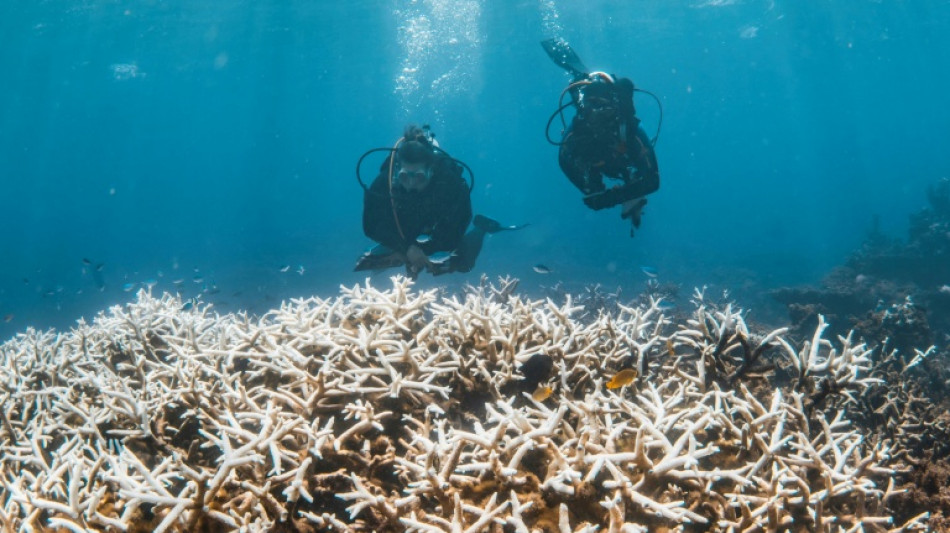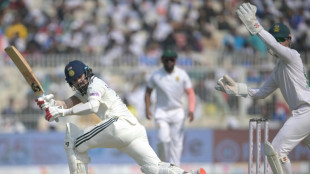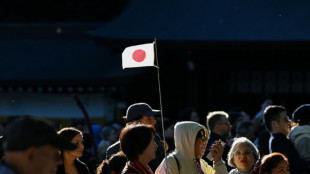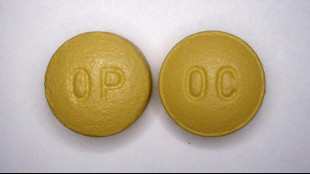
-
 England captain Itoje savours 'special' New Zealand win
England captain Itoje savours 'special' New Zealand win
-
Wales's Evans denies Japan historic win with last-gasp penalty

-
 Zelensky renews calls for more air defence after deadly strike on Kyiv
Zelensky renews calls for more air defence after deadly strike on Kyiv
-
NBA's struggling Pelicans sack coach Willie Green

-
 Petain tribute comments raise 'revisionist' storm in France
Petain tribute comments raise 'revisionist' storm in France
-
Spain on World Cup brink as Belgium also made to wait

-
 Spain virtually seal World Cup qualification in Georgia romp
Spain virtually seal World Cup qualification in Georgia romp
-
M23, DR Congo sign new peace roadmap in Doha

-
 Estevao, Casemiro on target for Brazil in Senegal win
Estevao, Casemiro on target for Brazil in Senegal win
-
Ford steers England to rare win over New Zealand

-
 Massive march in Brazil marks first big UN climate protest in years
Massive march in Brazil marks first big UN climate protest in years
-
Spain rescues hundreds of exotic animals from unlicensed shelter

-
 Huge fire sparked by explosions near Argentine capital 'contained'
Huge fire sparked by explosions near Argentine capital 'contained'
-
South Africa defy early red card to beat battling Italy

-
 Sinner beats De Minaur to reach ATP Finals title match
Sinner beats De Minaur to reach ATP Finals title match
-
Zelensky vows overhaul of Ukraine's scandal-hit energy firms

-
 South Africa defy early red card to beat Italy
South Africa defy early red card to beat Italy
-
Alex Marquez claims Valencia MotoGP sprint victory

-
 McIlroy shares lead with Race to Dubai title in sight
McIlroy shares lead with Race to Dubai title in sight
-
Climate protesters rally in Brazil at COP30 halfway mark

-
 Spike Lee gifts pope Knicks jersey as pontiff meets film stars
Spike Lee gifts pope Knicks jersey as pontiff meets film stars
-
BBC caught in crossfire of polarised political and media landscape

-
 'Happy' Shiffrin dominates in Levi slalom for 102nd World Cup win
'Happy' Shiffrin dominates in Levi slalom for 102nd World Cup win
-
Palestinian national team on 'mission' for peace in Spain visit

-
 Brazilian 'Superman' cheers child cancer patients in Ghana
Brazilian 'Superman' cheers child cancer patients in Ghana
-
India close in on win over South Africa after Jadeja heroics

-
 Huge explosions rock industrial area near Argentina's capital
Huge explosions rock industrial area near Argentina's capital
-
Bezzecchi takes pole for Valencia sprint and MotoGP

-
 Dominant Shiffrin leads after first slalom run in Levi
Dominant Shiffrin leads after first slalom run in Levi
-
Nine killed in accidental explosion at Indian Kashmir police station

-
 Climate protesters to rally at COP30's halfway mark
Climate protesters to rally at COP30's halfway mark
-
Fighting South Africa lose Rickelton after India 189 all out

-
 Harmer leads South Africa fightback as India 189 all out
Harmer leads South Africa fightback as India 189 all out
-
Prison looms for Brazil's Bolsonaro after court rejects his appeal

-
 EU bows to pressure on loosening AI, privacy rules
EU bows to pressure on loosening AI, privacy rules
-
India close in on lead despite South African strikes

-
 Curry's 49 points propel Warriors in 109-108 win over Spurs
Curry's 49 points propel Warriors in 109-108 win over Spurs
-
NZ boxer Parker denies taking banned substance after failed test

-
 Australia setback as Hazlewood ruled out of 1st Ashes Test
Australia setback as Hazlewood ruled out of 1st Ashes Test
-
Australia pace spearhead Josh Hazlewood ruled out of 1st Ashes Test

-
 UN Security Council to vote Monday on Trump Gaza plan
UN Security Council to vote Monday on Trump Gaza plan
-
Japan's Tomono leads after men's short program at Skate America

-
 China tells citizens to avoid Japan travel as Taiwan row grows
China tells citizens to avoid Japan travel as Taiwan row grows
-
Purdue Pharma to be dissolved as US judge says to approve bankruptcy

-
 Iran's first woman orchestra conductor inspires
Iran's first woman orchestra conductor inspires
-
Wood gets all-clear in boost for England

-
 Golf's world No. 8 Thomas has back surgery
Golf's world No. 8 Thomas has back surgery
-
Rebooted Harlem museum celebrates rise of Black art

-
 'Desperation in the air': immigrant comics skewer Trump crackdown
'Desperation in the air': immigrant comics skewer Trump crackdown
-
UN regulator says shipping still wants to decarbonize -- despite US threats


Coral frozen in time throws lifeline for Great Barrier Reef
Rows of tanks filled with liquid nitrogen sit in temperature-controlled chambers at Sydney's Taronga zoo, cradling parts of the Great Barrier Reef's diverse and magnificent corals frozen in time.
The world's largest store of cryogenically frozen coral is a frosty Noah's Ark for an ecosystem that scientists warn could be the first to disappear if climate change is not combatted fast enough.
Trillions of cells from dozens of key coral species on the Great Barrier Reef (GBR) -— collected each year during mass spawning -- offer the chance to regenerate damaged and diminished corals now and into the future.
"Essentially, a pause button has been pressed on their biological clocks," said Justine O'Brien, manager of conservation science at Taronga Conservation Society Australia.
"I hope our collective efforts can help to retain the reef's beautiful diversity," she told AFP.
Since the coral programme began in 2011, Taronga's CryoDiversity Bank has been intruding annually on the GBR's spawning, when corals send eggs and sperm into the waters for breeding.
Scientists collect the sperm and mix it with cryoprotectants, which remove water as the samples freeze, and protect internal cell structures.
Eggs contain too much water and fat to be frozen without damage using current techniques, so for now cannot be similarly banked, but other cells are also harvested and frozen for research.
The samples are placed into liquid nitrogen and stored at -196 degrees Celsius (-320 Fahrenheit). Strict measures ensure the temperature never changes.
"We can keep them alive indefinitely," O'Brien said.
"You could thaw them out a few years from now, a few decades from now or hundreds of years from now and they will have retained the same fertilising potential that existed when they were initially collected and frozen."
- Coral disease, death -
So far the bank has 34 species of the approximately 400 kinds of hard corals on the GBR, prioritising those most essential to reef structure and function, with plans to expand.
In addition to reproduction, the samples can be used for research and record-keeping, helping track the effects of warming seas, overfishing and pollution that threaten coral reefs globally.
Scientists forecast that at 1.5 Celsius (34.7 Fahrenheit) of warming, some 70 to 90 percent of the world's coral reefs could disappear -- a disastrous prospect for people and the planet.
Coral reefs support not just marine life but hundreds of millions of people living in coastal communities by providing food, protection from storms and livelihoods through fishing and tourism.
Warming oceans cause coral to expel the algae that provides not just their characteristic colour but also their food. Once bleached, they are exposed to disease and death by starvation.
A global coral bleaching event has been unfolding since 2023, spreading to 84 percent of the world's reefs, across the Pacific, Indian and Atlantic oceans.
Live coral cover has halved since the 1950s due to climate change and environmental damage, the International Coral Reef Initiative, a global conservation partnership, said this year.
Next week, nations will meet in France for a UN oceans summit where they will be under pressure to deliver action and much-needed funds to better protect the world's overexploited and polluted seas.
But the third UN Ocean Conference may struggle to find global consensus and raise money given ongoing disagreements over deep-sea mining, plastic trash and overfishing.
- 'Window closing' -
O'Brien warns the GBR is under pressure, despite the resilience it has already shown.
"We know the frequency and severity of impacts that are now occurring are not giving the reef enough recovery time," she said.
The cryobank, one of just a handful around the world, offers a glimmer of hope.
Last year, Taronga and Australian Institute of Marine Science researchers successfully thawed frozen coral sperm to fertilise fresh eggs, producing viable coral larvae that were placed back onto the reef.
It was a world-first for the GBR and preliminary surveys show the transplants have grown well.
These efforts -- part of a broader programme looking at everything from shading corals to transplanting more heat-tolerant varieties -- are a "small part of the solution to the global coral reef crisis," said WWF-Australia's head of oceans Richard Leck.
But he warned that more needs to be done to ensure the long-term survival of coral.
"Reefs are incredibly resilient and they do bounce back remarkably quickly after major disturbances," he told AFP.
"There is certainly a window to get reefs through climate change, but it is clear that that window is closing."
I.Yassin--SF-PST



